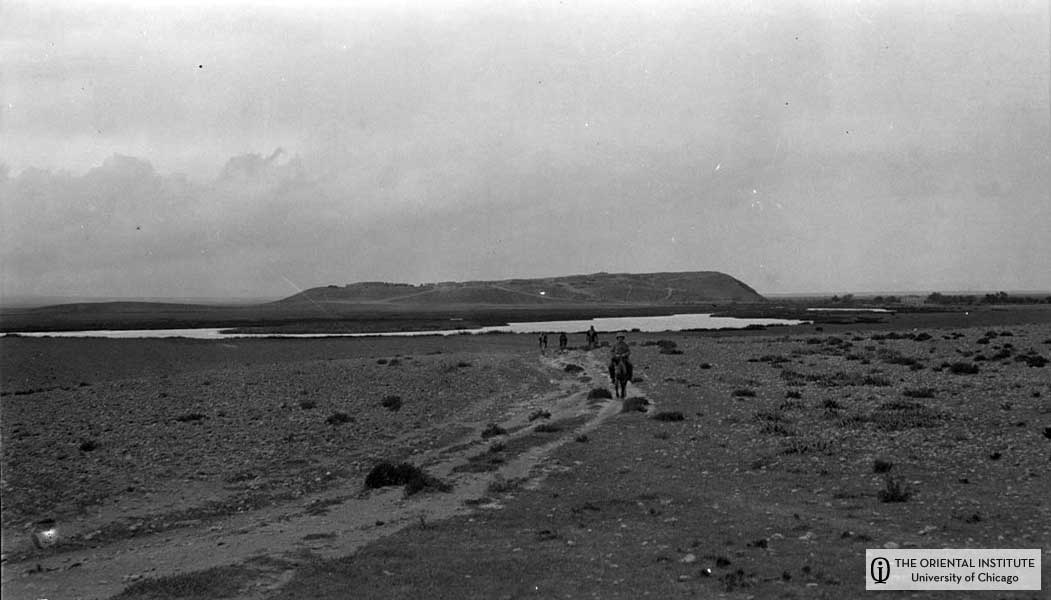Kusseir (or Kosseir), between the Lebanons
May 15, 1920
I am sitting in a freight car, looking out over the fine plain of Kadesh, with the huge mound of the ancient city rising an hour’s ride distant, dominated by the majestic ranges of Lebanon and anti-Lebanon on either side. I wonder if you remember how I once worked all the way across the Atlantic, straightening out the great game of war-chess which Ramses II played on this plain with the Hittites in the 13th century B.C.? It is no small privilege to be permitted now for the first time to look out upon the places mentioned in Ramses’ war records, and to recognize here point after point, over which I worked at such a disadvantage without having seen them. Tomorrow, however, I shall have a chance to see things at closer range, for the mound is still four or five miles distant, if not more.
 Kadesh (on the Orontes): View looking over the Orontes from the east towards the mound. A member of the Oriental Institute party on the road. (N. 3306, P. 6866)
Kadesh (on the Orontes): View looking over the Orontes from the east towards the mound. A member of the Oriental Institute party on the road. (N. 3306, P. 6866)
The last hours at Aleppo, like the close of our stay at every important place, were very busy ones for me. I was awfully rushed, with a host of things to attend to (and my fellow-voyagers could not even remember to have the drinking water tank filled with fine Aleppo water before it was sent to the train), and at the last minute two visitors came in. One was Dr. Lambert, in charge of the American relief work here. I was very much pleased with him, and regretted it was not possible to have talked longer with him. Then came a Miss Wickett, Dr. Lambert’s secretary, who brought the letters of the American Relief Committee to be taken down to headquarters at Beyrut. Miss Wickett was President Faunce’s secretary at Brown University when I was giving the Ann Mary Brown Lectures there. I had of course forgotten her completely. She told me they had made all preparations to put us up at the quarters of the American Relief, but unfortunately we knew nothing of it.
This place is just south of Homs and the lake of Homs, which you can easily find on the map. The governor, as I mentioned above, arranged to have orders come here from Homs to facilitate our visit in every way. Luckily I took the precaution to ask for a copy of the governor’s letter sent down here. We had to turn out at 3:30 this morning and get away with our large equipment of stuff on the only train, leaving at 5:45. On arriving here at 2:00 P.M., I found the governor’s instructions had not arrived, and the copy I had asked for was invaluable. We had expected to stay in the station, and put up our field beds there, but it had been burned down like all the other stations on the line, by the retreating Turks and Germans, and is now being rebuilt. Luckily the station master has been amiable and has allowed us the use of an empty freight car, where we have put up our field beds. There is a cold raw wind blowing, and it penetrates to the skin. I am going to change my underclothes, and feel lucky that I have some heavier ones here. At the present moment a squally shower has added to our discomfort, in spite of the fact that the rainy season is long past.
The station-master went up with me to see the mudir, and the commandant. Both agreed to aid us not only on the basis of the governor’s letter, but also because, as they informed me with much impressiveness, it was America which enabled the Allies to win the war. I had to sit, after a long and weary walk to the mudir’s office, for an hour and a half talking with him and his officers, and then of course accept an invitation to dinner this evening. This infliction, in view of the fact that the horses are coming at 4:30 tomorrow morning, I would have been very glad to escape, but the mudir promised to send soldiers back to the station with me, and I could not easily refuse. It was the less welcome because I had been obliged to accept an invitation to dinner last evening in Aleppo with the French liaison officer, who is the representative of France there. Out at 3:30 this morning, and again tomorrow at the same hour! with a dinner preceding each turn out! It’s a strenuous life. But we are getting over the ground, and every step now brings home that much nearer. I secured some interesting antiquities in Aleppo, but must postpone any account of them.
For the full story of my exciting trip you should come to the special exhibit “Pioneers to the Past: American Archaeologists in the Middle East, 1919-1920,” at the Oriental Institute!
1155 East 58th Street Chicago, IL 60637
Hours:
- Tuesday 10:00 am to 6:00 pm
- Wednesday 10:00 am to 8:30 pm
- Thursday 10:00 am to 6:00 pm
- Friday 10:00 am to 6:00 pm
- Saturday 10:00 am to 6:00 pm
- Sunday noon to 6:00 pm
- Closed Mondays
http://oi.uchicago.edu/museum/special/pioneer/
And visit me on facebook at: http://www.facebook.com/profile.php?id=3318774#/profile.php?v=info&ref=profile&id=100000555713577